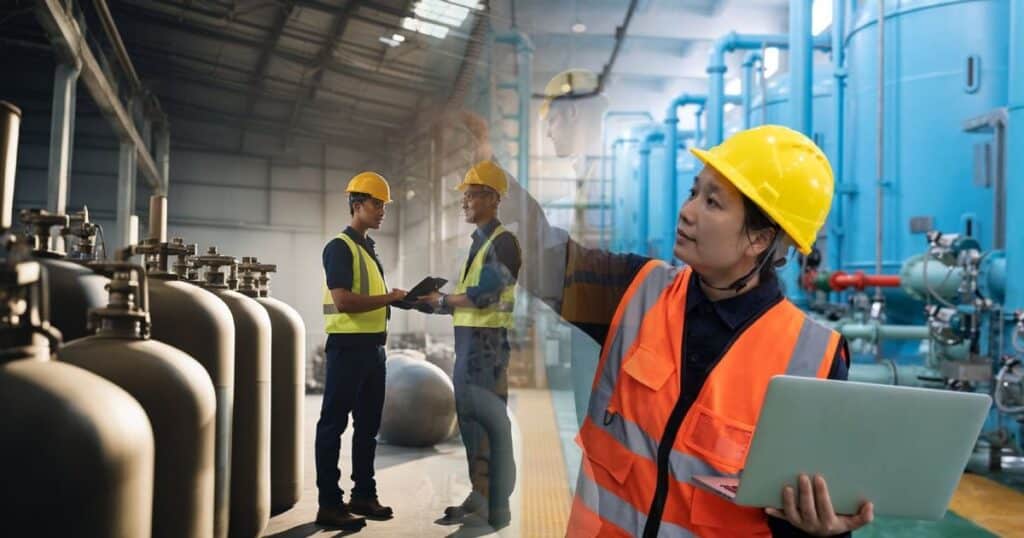When selecting an industrial gas supplier, businesses must recognise the importance of reliability, quality, and cost-effectiveness. These factors directly impact operational efficiency and can ultimately affect the bottom line. As industrial gases like nitrogen, oxygen, and argon play a critical role in a wide range of sectors, from healthcare to manufacturing, choosing a supplier isn’t just about price; it’s about ensuring that the gas meets industry standards and is delivered in a timely, safe, and environmentally responsible manner.
In the search for a supplier, you should also consider the geographical reach and network of the supplier, especially if your operations span the US, Europe, Asia, or the entire region of the Americas. A supplier with a comprehensive regional presence can be advantageous for consistency in service and product availability. Furthermore, with customer service paramount, your chosen supplier should be equipped to handle inquiries and provide support whenever needed. This includes offering robust after-sale services and demonstrating a commitment to maintaining a long-term relationship.
Key Takeaways
- Choosing the right industrial gas supplier affects your operations’ efficiency and profitability.
- Consider the supplier’s coverage across regions like America, Europe, and Asia to ensure consistent service.
- Customer service and post-sale support are essential criteria for a reliable industrial gas supply partnership.
Evaluating Industrial Gas Providers

Choosing the right industrial gas provider is crucial for ensuring the quality and efficiency of your operations. Reliability, cost, and capacity are significant in your decision-making process.
Assessing Quality and Reliability
Assessing a supplier’s quality and reliability involves scrutinising their product purity levels and safety records. Globally recognised suppliers such as Linde and Air Liquide have set high industry standards in these areas. When considering quality, investigate their production processes and whether they have had any significant recalls or safety incidents. Reliability also means evaluating customer service response times and the margins of error they allow in their deliveries.
Understanding Pricing Structures
Industrial gas pricing structures can be complex, varying from one provider to another. Calculate the total cost of ownership, which not only includes the price of the gases but also considers delivery charges, rental fees for cylinders or containers, and any additional services offered. For example, Praxair and Matheson may offer competitive pricing options but consider the potential for negotiation based on your use volume and the contract’s length.
Analysing Production & Delivery Capacity
Their production capacity and delivery infrastructure dictate your supplier’s ability to meet your demand. Significant players like Linde and Air Liquide have extensive networks and can offer consistent supply and distribution. Look into their productivity statistics and whether they have experienced significant supply chain disruptions. Revenue growth can indicate a supplier’s capacity to invest in their operational capabilities, which can benefit your supply consistency in the long term.
Industrial Gases and Their Uses

Selecting a supplier for industrial gases hinges on understanding their diverse uses and industries. Below are critical applications across sectors that you should be aware of.
Medical Gases for Healthcare
Medical gases like oxygen and nitrous oxide are vital in healthcare. Oxygen is crucial for respiration therapy and surgical support, whereas nitrous oxide is an anaesthetic agent. Your choice of a medical gas supplier should prioritise product purity and reliable delivery systems, especially for life-saving applications.
Specialty Gases for Electronics Industry
Producing semiconductors and other electronic components extensively uses speciality gases such as argon and hydrogen. These gases are integral in processes like silicon wafer manufacturing and chip production. Seek suppliers with a proven track record for consistency and contamination control in their speciality gases to ensure high-quality electronic products.
Atmospheric Gases and Their Purposes
Atmospheric gases like nitrogen and oxygen are versatile powerhouses in various industrial processes. Nitrogen is used for its inert properties in food preservation and chemical manufacturing. At the same time, oxygen, indispensable for combustion and steelmaking, requires a supplier capable of providing gases at scale without compromising on quality or supply dependability.
Supply Options for Various Industrial Gases
Considering supply options such as on-site production, bulk liquid delivery, or cylinder supply can be crucial depending on your gas usage levels. Whether you need large quantities of argon for welding or hydrogen for refining, your supplier should offer flexible solutions catered to your usage patterns and storage capabilities.
Frequently Asked Questions
When choosing an industrial gas supplier, carefully examine their reliability, experience, range of products, and adherence to safety standards.
What criteria should be considered when selecting an industrial gas supplier?
You should assess the supplier’s ability to provide a consistent supply, their expertise in handling gases safely, and the quality of their customer service. Understand the level of support they offer for emergencies and how well they maintain industry compliance.
Who are the industry leaders in the supply of industrial gases?
Companies like Air Liquide, Linde, and Praxair are recognised for their extensive networks, comprehensive services, and global reach. Each supplier has a strong reputation for delivering industrial gases efficiently and reliably.
Can you distinguish between natural gas and industrial gases?
Natural gas is mainly used for heating and energy and is composed predominantly of methane. Industrial gases include substances like oxygen, nitrogen, and argon and are produced for various industrial applications, often requiring specific production techniques.
What are the most common types of gases used in industrial applications?
Common industrial gases are oxygen, nitrogen, carbon dioxide, helium, and acetylene. These gases serve various purposes, from welding and cutting to refrigeration and aerospace engineering.
How does the purity level of industrial gases affect their usage?
The purity level of industrial gases is crucial as it can influence the efficiency and quality of industrial processes. High-purity gases are required in sectors like electronics and pharmaceuticals, where even minor impurities can cause significant product defects.
What are the safety considerations when sourcing gases from an industrial supplier?
Choosing a supplier who demonstrates a solid commitment to safety protocols and regulatory compliance is imperative. Proper handling, storage, and transportation are essential to prevent accidents, and suppliers must provide material safety data sheets and adequate safety training.


